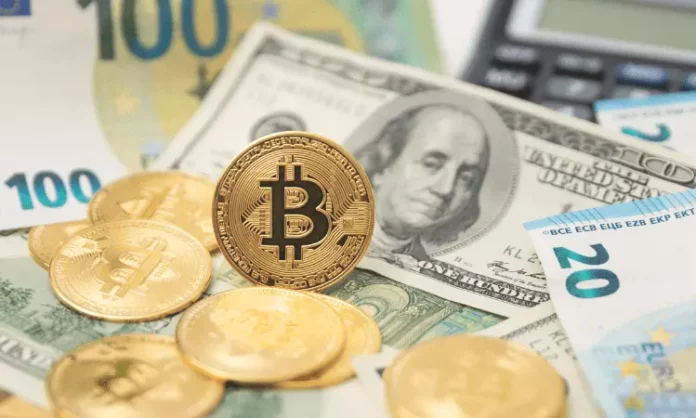The financial world has been undergoing a remarkable transformation with the advent of cryptocurrencies.
Bitcoin, the pioneer in this digital realm, introduced the concept of a decentralized, borderless, and technologically driven form of currency.
However, the question that lingers in the minds of many individuals: Is cryptocurrency real money?
To truly understand this debate, it is essential to delve into the fundamental characteristics of money, the nature of cryptocurrencies, and the evolving landscape of the financial ecosystem.
What Is Money?
Money is a universally accepted medium of exchange and store of value in an economy.
It represents a system of value that facilitates trade by simplifying transactions, eliminating the need for barter.
Money takes various forms, such as coins, banknotes, and digital currency.
It serves several functions: a unit of account (measuring value), a medium of exchange (facilitating transactions), and a store of value (retaining worth over time).
Central banks typically regulate and issue money, ensuring its stability and trustworthiness.
Money plays a vital role in modern economies, enabling commerce, investment, and economic growth.
Its significance transcends cultural and geographical boundaries, making it a fundamental aspect of human civilization.
What Is Cryptocurrency?
Cryptocurrency refers to a digital or virtual form of currency that employs cryptographic techniques for security.
It operates independently of traditional banking systems and is decentralized, using blockchain technology to record and verify transactions.
Unlike traditional currencies, cryptocurrencies are not issued or regulated by any central authority, such as a government or central bank.
Instead, they rely on a distributed ledger system, where transactions are transparently recorded across a network of computers.
Bitcoin, created in 2009 by an anonymous entity known as Satoshi Nakamoto, was the first cryptocurrency and paved the way for thousands of others, each with its unique features and purposes.
Cryptocurrencies have gained popularity as a digital investment and medium of exchange, but their volatility and regulatory challenges continue to be points of contention.
What Are The Differences Between Cryptocurrency And Cash?
Here are some differences between crypto and cash:
1. Value And Volatility.
One of the most striking differences between cryptocurrencies and cash is their value and volatility.
Cryptocurrencies like Bitcoin, Ethereum, and Litecoin are notorious for their price fluctuations.
The value of a cryptocurrency can skyrocket one day and plummet the next.
This volatility can be attributed to various factors, including market sentiment, adoption, and regulatory news.
The appeal of cryptocurrencies lies in their potential for rapid appreciation.
Investors and traders often flock to cryptocurrencies in pursuit of substantial gains.
However, this volatility also makes them a risky investment, as prices can drop just as quickly as they rise.
On the other hand, traditional currency, such as fiat money, is comparatively stable in value.
Government-issued currencies, like the US Dollar or Euro, are backed by the issuing authorities and are less susceptible to wild price swings.
While inflation can erode the purchasing power of cash over time, it generally doesn’t exhibit the same level of daily or weekly volatility seen in cryptocurrencies.
2. Control.
Cryptocurrencies offer a level of financial control that is unparalleled in the traditional financial system.
When you own cryptocurrency, you have full control over your digital wallet and transactions.
This means that you can send or receive cryptocurrency at any time, without the need for intermediaries like banks.
The decentralized nature of cryptocurrencies empowers users with control over their funds, free from centralized authority.
In contrast, traditional fiat money transactions often involve intermediaries such as banks, payment processors, or government agencies.
These intermediaries have the authority to monitor and sometimes restrict transactions, especially for large sums.
Your control over cash is limited by the rules and regulations of your country’s financial system.
3. Safety And Security.
The security of cryptocurrency transactions is built on blockchain technology, which is renowned for its robustness.
Each transaction is recorded on a public ledger, making it highly transparent and tamper-resistant.
Additionally, cryptocurrency wallets can be secured with advanced encryption and authentication methods, enhancing the safety of digital assets.
However, the security of cryptocurrency also comes with challenges.
If you lose your private keys or become a victim of hacking, you may lose access to your funds permanently.
There is no central authority to turn to for assistance in such cases.
Fiat money transactions are relatively straightforward, and physical cash can be held and stored securely.
However, cash is vulnerable to theft, loss, and counterfeiting.
Physical cash can be easily stolen or damaged, and once it’s gone, there may be no way to recover it.
4. Protection.
Cryptocurrencies do not come with the same level of protection as traditional bank accounts.
If you accidentally send cryptocurrency to the wrong address or fall victim to a scam, recovering your funds can be extremely difficult.
There is no central authority to reverse transactions or provide refunds.
Traditional cash offers a higher level of protection through government-backed deposit insurance.
In many countries, bank deposits are insured up to a certain amount, providing a safety net in case of bank failures or fraudulent activities.
This protection gives cash users peace of mind that their money is safeguarded.
5. Regulations.
The regulatory environment for cryptocurrencies is still evolving.
Different countries have adopted various approaches, ranging from outright bans to embracing and regulating the industry.
The lack of uniform regulations globally creates uncertainty for both users and businesses operating in the cryptocurrency space.
Traditional cash is heavily regulated and subject to strict government oversight.
Central banks and financial institutions closely monitor the circulation and use of cash to combat illegal activities like money laundering and tax evasion.
Cash transactions often require reporting for large sums, ensuring transparency in financial activities.
6. Supply.
Most cryptocurrencies operate on a fixed supply model, meaning there is a maximum limit to the number of coins that can ever be created.
Bitcoin, for example, has a limited supply of 21 million coins.
This scarcity is often cited as a key feature driving the value of cryptocurrencies.
Traditional fiat money doesn’t have a fixed supply.
Central banks have the authority to print more money, which can lead to inflation if done excessively.
The supply of cash is influenced by economic policies and decisions made by monetary authorities.
7. Accessibility.
Cryptocurrencies have the potential to increase financial inclusion by providing access to digital financial services for individuals without traditional banking infrastructure.
Anyone with a computer or phone that can connect to the internet can participate in the cryptocurrency ecosystem.
While cash is widely accepted, there are still areas with limited access to banking services, making cash a more accessible form of currency in some regions.
However, the global shift toward digital payments may reduce the significance of this advantage in the long term.
8. Acceptance.
Cryptocurrency acceptance is growing, with an increasing number of businesses, online retailers, and service providers now accepting digital currencies as a form of payment.
This expanding acceptance is a testament to the growing influence of cryptocurrencies in the global economy.
Cash remains widely accepted for everyday transactions and is often the preferred choice for small, in-person purchases.
However, as digital payment methods gain popularity, the acceptance of cash is slowly declining in some areas.
Is Cryptocurrency Real Money?
The question of whether cryptocurrency qualifies as real money is subject to ongoing debate.
Cryptocurrencies possess essential attributes of money, including functioning as a medium of exchange, a unit of account, and a store of value.
They leverage innovative blockchain technology to enable secure, borderless transactions.
However, challenges such as scalability, price volatility, and regulatory concerns contribute to skepticism.
While cryptocurrencies offer novel possibilities, their evolving nature and the lack of universal recognition as legal tender raise questions about their status as traditional money.
As the financial landscape continues to transform, the classification of cryptocurrency as real money remains contingent on the convergence of technological advancement, regulatory clarity, and broader societal acceptance.
Arguments For Cryptocurrencies As Real Money.
Supporters of cryptocurrencies argue that they possess attributes that align with the traditional characteristics of money, thus qualifying them as real money.
The borderless nature of cryptocurrencies enables international transactions without the complexities of currency conversion.
This could potentially revolutionize global trade and finance, eliminating the need for intermediaries and reducing transaction costs.
Moreover, the emergence of cryptocurrencies has brought financial services to underserved populations.
In regions with limited access to traditional banking, individuals can now participate in the global economy through their smartphones.
This inclusionary aspect of cryptocurrencies has the potential to uplift economies and reduce financial inequality.
Challenges To Cryptocurrencies As Real Money.
On the flip side, skeptics raise valid concerns about the feasibility of cryptocurrencies as a replacement for traditional money.
Regulatory hurdles remain a significant challenge, as governments grapple with how to classify and regulate these digital assets.
The decentralized nature of cryptocurrencies raises questions about accountability and consumer protection, leading to debates on whether a balance can be struck between innovation and regulation.
Furthermore, the pseudonymous nature of cryptocurrency transactions has raised concerns about their potential for facilitating illegal activities.
Money laundering, tax evasion, and illicit transactions have been associated with cryptocurrencies, making regulatory oversight crucial to prevent misuse.
The Evolving Nature Of Money.
Throughout history, the concept of money has continually evolved in response to technological advancements and changing societal needs.
From barter systems to commodity money, and from fiat currencies to cryptocurrencies, each iteration of money has brought about new possibilities and challenges.
Cryptocurrencies represent the latest chapter in this evolution, offering the potential to redefine how we transact, invest, and think about value.
Conclusion.
In the ongoing debate surrounding whether cryptocurrencies are real money, it becomes clear that they possess attributes that align with the traditional functions of money.
However, challenges related to scalability, stability, and regulatory concerns continue to shape the narrative.
The future of cryptocurrencies as real money hinges on how these challenges are addressed and how the technology continues to evolve.
As we navigate this transformative journey, it is essential to remain informed about the developments in the cryptocurrency space and the broader evolution of the concept of money itself.







